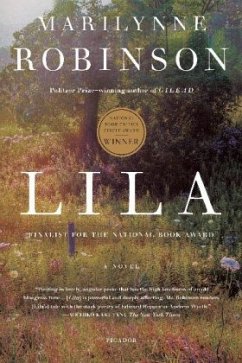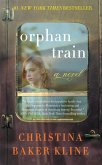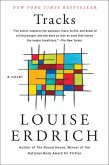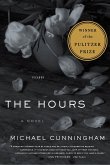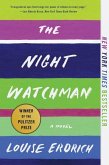The New York Times Bestseller
Winner of the National Book Critics Circle Award
National Book Award Finalist
A new American classic from the Pulitzer Prize-winning author of Gilead and Housekeeping
Marilynne Robinson, one of the greatest novelists of our time, returns to the town of Gilead in an unforgettable story of a girlhood lived on the fringes of society in fear, awe, and wonder.
Lila, homeless and alone after years of roaming the countryside, steps inside a small-town Iowa church-the only available shelter from the rain-and ignites a romance and a debate that will reshape her life. She becomes the wife of a minister, John Ames, and begins a new existence while trying to make sense of the life that preceded her newfound security.
Neglected as a toddler, Lila was rescued by Doll, a canny young drifter, and brought up by her in a hardscrabble childhood. Together they crafted a life on the run, living hand to mouth with nothing but their sisterly bond and a ragged blade to protect them. Despite bouts of petty violence and moments of desperation, their shared life was laced with moments of joy and love. When Lila arrives in Gilead, she struggles to reconcile the life of her makeshift family and their days of hardship with the gentle Christian worldview of her husband which paradoxically judges those she loves.
Revisiting the beloved characters and setting of Robinson's Pulitzer Prize-winning Gilead and Home, a National Book Award finalist, Lila is a moving expression of the mysteries of existence that is destined to become an American classic.
Winner of the National Book Critics Circle Award
National Book Award Finalist
A new American classic from the Pulitzer Prize-winning author of Gilead and Housekeeping
Marilynne Robinson, one of the greatest novelists of our time, returns to the town of Gilead in an unforgettable story of a girlhood lived on the fringes of society in fear, awe, and wonder.
Lila, homeless and alone after years of roaming the countryside, steps inside a small-town Iowa church-the only available shelter from the rain-and ignites a romance and a debate that will reshape her life. She becomes the wife of a minister, John Ames, and begins a new existence while trying to make sense of the life that preceded her newfound security.
Neglected as a toddler, Lila was rescued by Doll, a canny young drifter, and brought up by her in a hardscrabble childhood. Together they crafted a life on the run, living hand to mouth with nothing but their sisterly bond and a ragged blade to protect them. Despite bouts of petty violence and moments of desperation, their shared life was laced with moments of joy and love. When Lila arrives in Gilead, she struggles to reconcile the life of her makeshift family and their days of hardship with the gentle Christian worldview of her husband which paradoxically judges those she loves.
Revisiting the beloved characters and setting of Robinson's Pulitzer Prize-winning Gilead and Home, a National Book Award finalist, Lila is a moving expression of the mysteries of existence that is destined to become an American classic.

In ihrem Roman „Lila“ erzählt Marilynne Robinson von verlorenen Söhnen und versprengten Fremden, in einem
Amerika, in dem keiner der Einsamkeit entkommt. Sie gehört zu den Lieblingsautoren von Präsident Obama
VON LOTHAR MÜLLER
Als Barack Obama in diesem Sommer in Charleston, South Carolina die Trauerrede auf den Reverend Pinckney und die weiteren acht afroamerikanischen Opfer des Attentats hielt, das ein junger Weißer am 17. Juniwährend einer Bibelstunde verübt hatte, begann er mit dem Satz: „Giving all praise and honor to God.“ Seine Ansprache stellte die Sprache der Bibel in den Dienst der politischen, an die gesamte Nation adressierten Rhetorik der Überwindung des Rassenhasses. Eine der Hoffnungsformeln, die er dabei ins Spiel brachte, war das „reservoir of goodness“, das er einem Buch von Marilynne Robinson entnahm.
Seit Jahren ist der amerikanische Präsident ein erklärter Bewunderer dieser Autorin, die 1943 in der Provinz von Idaho geboren wurde und dort aufwuchs, seit Jahrzehnten in Iowa lebt und am Writers Workshop der University of Iowa lehrt. Marilynne Robinson verfolgt in ihren Romanen und Essays seit ihrem Debüt „Housekeeping“ (1980) an wechselnden Stoffen ein Projekt: die Sprache der Bibel und die Erfahrungswelt der Frommen – Prediger, Reverends, Kirchenbesucher – in die moderne amerikanische Literatur einzuschmelzen. Und zwar so, dass die Romane dabei nicht selber zu Predigten werden, sondern bleiben, was moderne Romane sind: anthropologische Sonden, Erkundungen und Darstellungen von Lebensmustern und Innenwelten.
Der Roman „Gilead“ (2004), fast ein Vierteljahrhundert nach dem Debüt erschienen und mit dem Pulitzer Preis ausgezeichnet, war der Beginn einer Trilogie, deren Bände sich gut für sich lesen lassen. Denn die einzelnen Lebensgeschichten werden darin nicht fortlaufend erzählt. Sie stehen nebeneinander, alle Zeitschichten sind an den zentralen Ort gebunden, an Gilead, das kleine Kaff in Iowa, das so heißt wie in der Bibel ein Landstrich östlich des Jordan. Man könnte es auf der Landkarte der amerikanischen Literatur etwa nördlich der Regionen ansiedeln, durch die in John Steinbecks Roman „Früchte des Zorns“ die von der Großen Depression entwurzelten „Oakies“ auf ihrem Weg ins gelobte Land Kalifornien ziehen.
Hier siedelt Marilynne Robinson den Reverend John Ames an und die Familie seines Freundes, Glaubensbruders und Namensvetters John Ames Boughton. Verlorene Söhne kehren auf verschlungenen Wegen ins Elternhaus zurück, Fahrende finden zu einer prekären Sesshaftigkeit, Gemeinden bestehen aus einer Summe von Einsamen. Die Trilogie führt in eine detailscharf gezeichnete Provinz der frommen Weißen des zwanzigsten Jahrhunderts. Wenn in „Gilead“ der alte Reverend, dem Tode nah, in dem langen Brief an seinen kleinen Sohn, aus dem der Roman besteht, am Ende von den aufkeimenden Rassenunruhen seiner Gegenwart, des Jahres 1956, berichtet, ahnt man, warum Obama es auf die Liste seiner Lieblingsbücher gesetzt hat.
Die Geschichte des verlorenen Sohnes steht im Zentrum des mittleren Bandes der Trilogie, „Home“ (2008). Nun hat der S. Fischer Verlag für das deutsche Publikum den Abschlussband herausgebracht, „Lila“. Die Titelheldin, eine der vielen stillen, erzählerisch ungemein reichen Frauenfiguren Robinsons, ist die junge Ehefrau des alten Reverend John Ames.
Sie könnte einer alten Blues-Ballade (oder einer Steinbeck-Hommage wie Bruce Springsteens CD „The Goast of Tom
Joad“) entstammen, kennt die Landstraße und die Campfires so gut wie das Innere eines Bordells in St. Louis. Sie hat ihre Kindheit in den 1920er Jahren verbracht und ist in den Jahren der Großen Depression in der Dust Bowl der Wanderarbeiter umhergezogen. Die Einzelgängerin Doll hat sie als Kind gestohlen und in die Welt der Fahrenden geholt. Die Ruhelosigkeit wird sie in Gilead nicht ablegen, die Landstreicherin Doll nicht vergessen: „Ortsleute hielten sich für was Besseres. Das wussten sie alle und hassten sie dafür.“
Eine ehemalige Hure aus der Welt der homeless people heiratet einen alten, gütigen Reverend, schreibt auf dem Weg zur Taufe die Worte des Propheten Ezechiel ab, erhält einen Grundkurs in Bibellektüre und Erläuterungen zu den Predigten des Reverend – das klingt nach einer erbaulichen Legende. Es ist aber ein Roman, ganz von dieser Welt, der in einer gelassenen Prosa eher von Varianten der Einsamkeit erzählt als vom Ankommen in einer erlösungsgewissen Welt. Das Leben als Wander- und Pilgerschaft kann im Land der Pilgrim Fathers den religiösen Echoraum kaum verabschieden, aber erkennbar durch die historisch konkrete Welt führen, die „Vereinigten Staaten von Amerika“: so nennt der Roman ausdrücklich seinen Handlungsraum, er spielt zwischen Großer Depression und den Jahren nach dem Zweiten Weltkrieg.
Die Landstreicherin Doll steht im Zentrum der Erinnerungen Lilas an ihre Kindheit. Einer ihr nahen Erzählerstimme, die in der dritten Person berichtet, ist die Formung der Erinnerungen anvertraut. Durch die Sprache dieser Stimme wird das Messer der Landstreicherin, der stumme Zeuge eines Mordes, zu einer der Hauptfiguren des Romans. Ebenso das Wasser, der Gegenspieler des Staubs, als Element der Landschaft wie der Taufe.
Lilas Lebensstationen hat Marilynne Robinson kunstvoll ineinander geblendet. Die Kindheit, die Wanderjahre, die Ankunft in Gilead, zunächst in einer Hütte nahe der Stadt, dann in der Kirche, die rätselhafte Ehe mit dem Reverend, die Begegnung mit einem streunenden Jungen, in dem ihr ihre Heimatlosigkeit begegnet, schließlich Schwangerschaft und Geburt des Sohnes, alle diese Zeitschichten überlagern einander. Das ist nicht nur ein Tribut an die Erzähltechniken des modernen Romans. Es dient dazu, das Nicht-Ankommen der Figuren zu bewahren, ihre Einsamkeit. „Vielleicht bringe ich ihm eine neue Art Trauer bei“, denkt Lila über den Reverend. Diese Verlorenheit ist eingelassen in Landschaftsbilder, samt Brennnesseln, Löwenzahnblättern, Wildmöhren.
„Den Löwen hätte sie den lieben langen Tag brüllen sehen mögen.“ Der Metro-Goldwyn-Mayer-Löwe ist das Wappentier der wunderbaren Passagen über die Kino-Leidenschaft der Heldin. Er wacht über Lila im Etablissement in St. Louis und begleitet sie nach Gilead, wo es wundersamerweise ein Kino gibt. Lila sieht „To Have and Have Not“, „Der Schatz der Sierra Madre“, „The Postman Always Rings Twice“ und vieles andere: „Sie musste an die alten Zeiten denken, als sie nur für ihre paar Stunden im Kino gelebt hatte, wo alle im Saal über die schönen Gespenster an dem unerreichbaren Ort seufzten und weinten und lachten, wo Leute Leben lebten, an denen auch Fremden was liegen konnte.“ Das gilt auch für diesen Roman: er zeigt Leben, an denen auch Fremden liegen kann.
Die Übersetzung hat es nicht leicht angesichts der Spannweite des Originals, dessen Prosa blitzschnell zwischen Bibelton und Slang wechselt. Aber bis auf Kleinigkeiten – etwa eine windige Nacht „voll Baumgeräusche“ (statt „voller Baumgeräusche“) – ist „Lila“ im Deutschen angekommen. Die gesamte Trilogie sollte folgen.
Marilynne Robinson: Lila. Roman. Aus dem Englischen von Uda Strätling. S. Fischer Verlag, Frankfurt am Main 2015. 288 S., 21,99 Euro. E-Book 19,99 Euro.
Gilead, das kleine Kaff in
Iowa, heißt wie in der Bibel ein
Landstrich östlich des Jordan
Über das Leben der Heldin
wacht in schweren Zeiten der
Metro-Goldwyn-Mayer-Löwe
Marilynne Robinson.
Foto: S. Fischer
Kirchenorgel, Gestühl und Pult in Erwartung des abwesenden Reverend: Die Fotografie von Walker Evans entstand 1936.
Foto: Walker Evans/Library of Congress
DIZdigital: Alle Rechte vorbehalten – Süddeutsche Zeitung GmbH, München
Jegliche Veröffentlichung und nicht-private Nutzung exklusiv über www.sz-content.de
"Writing in lovely, angular prose that has the high loneliness of an old bluegrass tune, Ms. Robinson has created a balladlike story . . . The novel is powerful and deeply affecting . . . Ms. Robinson renders [Lila's] tale with the stark poetry of Edward Hopper or Andrew Wyeth." -Michiko Kakutani, The New York Times
"Lila is a book whose grandeur is found in its humility. That's what makes Gilead among the most memorable settings in American fiction . . . Gilead [is] a kind of mythic everyplace, a quintessential national setting where our country's complicated union with faith, in all its degrees of constancy and skepticism, is enacted." -Sam Sacks, The Wall Street Journal
"My message is simple. Even if you haven't found the two previous books to your taste, give Lila a try . . . what we get . . . is the highest fictional magic: a character who seems so real, it's hard to remember that she exists only in the page of this book." -John Wilson, Chicago Tribune
"Lila, Marilynne Robinson's remarkable new novel, stands alone as a book to read and even read again. It's both a multilayered love story and a perceptive look at how early deprivation causes lasting damage . . . Robinson is a novelist of the first order." -Ellen Heltzel, The Seattle Times
"Grade: A Emotionally and intellectually challenging, it's an exploration of faith in God, love, and whatever else it takes to survive." -Entertainment Weekly
"Gorgeous writing, an absolutely beautiful book . . . This should come as no surprise to anyone familiar with Robinson, a novelist who can make the most quotidian moments epic because of her ability to peel back the surfaces of ordinary lives . . . [a] profound and deeply rendered novel." -David L. Ulin, Los Angeles Times
"Marilynne Robinson is one of the great religious novelists, not only of our age, but any age . . . Not even gorgeous is a strong enough word for what grandeur charges the pages of Lila." -Casey Cep, New Republic
"Written in beautiful, precise language, [Lila] glows like a banked fire that provides steady illumination. Lila should prompt first-time Robinson readers to track down her other works." -Martha Woodall, Philadelphia Inquirer
"Set aside the idea that Housekeeping, Marilynne Robinson's groundbreaking 1980 debut novel, should be on anyone's short list for the Great American Novel . . . It's just as well to open Lila with no preconceptions and just star reading. The pages in this volume are dense, but once you release yourself to Robinson's rhythms, the rewards are profound and layered, and what was intimidating becomes magnetic." -The Denver Post
"Ever since the publication of Robinson's thrilling first novel, Housekeeping, reviewers have been pointing out that, for an analyst of modern alienation, she is an unusual specimen: a devout Protestant, reared in Idaho. She now lives in Iowa City, where she teaches at the Iowa Writers' Workshop and where, for years, she has been accustomed to interrupting her career as a novelist to produce essays on such matters as the truth of John Calvin's writings. But Robinson's Low Church allegiance has hugely benefited her fiction . . . This is an unflinching book." -Joan Acocella, The New Yorker
"Marilynne Robinson tracks the movements of grace as if it were a wild animal, appearing for fleeting intervals and then disappearing past the range of vision, emerging again where we least expect to find it. Her novels are interested in what makes grace necessary at all--shame and its afterlife, loss and its residue, the limits and betrayals of intimacy. In Lila, her brilliant and deeply affecting new novel, even her description of sunlight in a St. Louis bordello holds a kind of heartbreak." -Leslie Jamison, The Atlantic
"Radiant . . . As in Gilead and Home, Robinson steps away from the conventions of the realistic novel to deal with metaphysical abstractions, signaling by the formality of her language her adoption of another convention, by which characters inhabiting an almost Norman Rockwell-ish world . . . live and think on a spiritual plane . . . [Lila is] a mediation on morality and psychology, compelling in its frankness about its truly shocking subject: the damage to the human personality done by poverty, neglect and abandonment." -Diane Johnson, The New York Times Book Review
"In her new novel, Lila, Marilynne Robinson has written a deeply romantic love story embodied in the language and ideas of Calvinist doctrine. She really is not like any other writer. She really isn't . . . Robinson has created a small, rich and fearless body of work in which religion exists unashamedly, as does doubt, unashamedly." -Cathleen Schine, The New York Review of Books
"Robinson's genius is for making indistinguishable the highest ends of faith and fiction . . . The beauty of Robinson's prose suggests an author continually threading with spun platinum the world's finest needle." -Michelle Orange, Bookforum
"The protagonist of the stunning Lila is as lost a character as can be found in literature . . . Don't hesitate to read Lila . . . It's a novel that stands on its own and is surely one of the best of the year." -Holly Silva, St Louis Post-Dispatch
"Existence and 'all the great storms that rise in it' are at the heart of Marilynne Robinson's glorious new novel, Lila . . . Lila is--at once--powerful, profound, and positively radiant in its depiction of its namesake, a child reared by drifters who finds a kindred soul in 'a big, silvery old man,' the Rev. John Ames . . . Life, death, joy, fear, doubt, love, violence, kindness--all of this, and more, dwells in Lila, a book, I will venture, already for the ages, its protagonist engraved upon our souls." -Karen Brady, The Buffalo News
"Lila is a dark, powerful, uplifting, unforgettable novel. And Robinson's Gilead trilogy--Gilead, Home, and Lila--is a great achievement in American fiction." -Bryan Wooley, Dallas Morning News
"Starred Review This third of three novels set in the fictional plains town of Gilead, Iowa, is a masterpiece of prose in the service of the moral seriousness that distinguishes Robinson's work . . . Lila is a superb creation. Largely uneducated, almost feral, Lila has a thirst for stability and knowledge." -Publishers Weekly
"*Starred Review* Robinson has created a tour de force, an unforgettably dynamic odyssey, a passionate and learned moral and spiritual inquiry, a paean to the earth, and a witty and transcendent love story--all within a refulgent and resounding novel so beautifully precise and cadenced it wholly tranfixes and transforms us." -Donna Seaman, Booklist
"*Starred Review* This is a lovely and touching story that grapples with the universal question of how God can allow his children to suffer. Recommended for fans of Robinson as well as those who enjoyed Elizabeth Strout's Olive Kitteridge, another exploration of pain and loneliness set against the backdrop of a small town." -Evelyn Beck, Library Journal
"Literary lioness Robinson--she's won a Pulitzer Prize for fiction, a Hemingway Foundation/PEN Award, and a National Book Critics Circle Award, among other laurels--continues the soaring run of novels with loosely connected story lines and deep religious currents that she launched a decade ago, almost a quarter century after her acclaimed fiction debut, Housekeeping . . . Lila's journey--its darker passages illuminated by Robinson's ability to write about love and the natural world with grit and graceful reverence--will mesmerize both longtime Robinson devotees and those coming to her work for the first time." -Elle
"Lila is a book whose grandeur is found in its humility. That's what makes Gilead among the most memorable settings in American fiction . . . Gilead [is] a kind of mythic everyplace, a quintessential national setting where our country's complicated union with faith, in all its degrees of constancy and skepticism, is enacted." -Sam Sacks, The Wall Street Journal
"My message is simple. Even if you haven't found the two previous books to your taste, give Lila a try . . . what we get . . . is the highest fictional magic: a character who seems so real, it's hard to remember that she exists only in the page of this book." -John Wilson, Chicago Tribune
"Lila, Marilynne Robinson's remarkable new novel, stands alone as a book to read and even read again. It's both a multilayered love story and a perceptive look at how early deprivation causes lasting damage . . . Robinson is a novelist of the first order." -Ellen Heltzel, The Seattle Times
"Grade: A Emotionally and intellectually challenging, it's an exploration of faith in God, love, and whatever else it takes to survive." -Entertainment Weekly
"Gorgeous writing, an absolutely beautiful book . . . This should come as no surprise to anyone familiar with Robinson, a novelist who can make the most quotidian moments epic because of her ability to peel back the surfaces of ordinary lives . . . [a] profound and deeply rendered novel." -David L. Ulin, Los Angeles Times
"Marilynne Robinson is one of the great religious novelists, not only of our age, but any age . . . Not even gorgeous is a strong enough word for what grandeur charges the pages of Lila." -Casey Cep, New Republic
"Written in beautiful, precise language, [Lila] glows like a banked fire that provides steady illumination. Lila should prompt first-time Robinson readers to track down her other works." -Martha Woodall, Philadelphia Inquirer
"Set aside the idea that Housekeeping, Marilynne Robinson's groundbreaking 1980 debut novel, should be on anyone's short list for the Great American Novel . . . It's just as well to open Lila with no preconceptions and just star reading. The pages in this volume are dense, but once you release yourself to Robinson's rhythms, the rewards are profound and layered, and what was intimidating becomes magnetic." -The Denver Post
"Ever since the publication of Robinson's thrilling first novel, Housekeeping, reviewers have been pointing out that, for an analyst of modern alienation, she is an unusual specimen: a devout Protestant, reared in Idaho. She now lives in Iowa City, where she teaches at the Iowa Writers' Workshop and where, for years, she has been accustomed to interrupting her career as a novelist to produce essays on such matters as the truth of John Calvin's writings. But Robinson's Low Church allegiance has hugely benefited her fiction . . . This is an unflinching book." -Joan Acocella, The New Yorker
"Marilynne Robinson tracks the movements of grace as if it were a wild animal, appearing for fleeting intervals and then disappearing past the range of vision, emerging again where we least expect to find it. Her novels are interested in what makes grace necessary at all--shame and its afterlife, loss and its residue, the limits and betrayals of intimacy. In Lila, her brilliant and deeply affecting new novel, even her description of sunlight in a St. Louis bordello holds a kind of heartbreak." -Leslie Jamison, The Atlantic
"Radiant . . . As in Gilead and Home, Robinson steps away from the conventions of the realistic novel to deal with metaphysical abstractions, signaling by the formality of her language her adoption of another convention, by which characters inhabiting an almost Norman Rockwell-ish world . . . live and think on a spiritual plane . . . [Lila is] a mediation on morality and psychology, compelling in its frankness about its truly shocking subject: the damage to the human personality done by poverty, neglect and abandonment." -Diane Johnson, The New York Times Book Review
"In her new novel, Lila, Marilynne Robinson has written a deeply romantic love story embodied in the language and ideas of Calvinist doctrine. She really is not like any other writer. She really isn't . . . Robinson has created a small, rich and fearless body of work in which religion exists unashamedly, as does doubt, unashamedly." -Cathleen Schine, The New York Review of Books
"Robinson's genius is for making indistinguishable the highest ends of faith and fiction . . . The beauty of Robinson's prose suggests an author continually threading with spun platinum the world's finest needle." -Michelle Orange, Bookforum
"The protagonist of the stunning Lila is as lost a character as can be found in literature . . . Don't hesitate to read Lila . . . It's a novel that stands on its own and is surely one of the best of the year." -Holly Silva, St Louis Post-Dispatch
"Existence and 'all the great storms that rise in it' are at the heart of Marilynne Robinson's glorious new novel, Lila . . . Lila is--at once--powerful, profound, and positively radiant in its depiction of its namesake, a child reared by drifters who finds a kindred soul in 'a big, silvery old man,' the Rev. John Ames . . . Life, death, joy, fear, doubt, love, violence, kindness--all of this, and more, dwells in Lila, a book, I will venture, already for the ages, its protagonist engraved upon our souls." -Karen Brady, The Buffalo News
"Lila is a dark, powerful, uplifting, unforgettable novel. And Robinson's Gilead trilogy--Gilead, Home, and Lila--is a great achievement in American fiction." -Bryan Wooley, Dallas Morning News
"Starred Review This third of three novels set in the fictional plains town of Gilead, Iowa, is a masterpiece of prose in the service of the moral seriousness that distinguishes Robinson's work . . . Lila is a superb creation. Largely uneducated, almost feral, Lila has a thirst for stability and knowledge." -Publishers Weekly
"*Starred Review* Robinson has created a tour de force, an unforgettably dynamic odyssey, a passionate and learned moral and spiritual inquiry, a paean to the earth, and a witty and transcendent love story--all within a refulgent and resounding novel so beautifully precise and cadenced it wholly tranfixes and transforms us." -Donna Seaman, Booklist
"*Starred Review* This is a lovely and touching story that grapples with the universal question of how God can allow his children to suffer. Recommended for fans of Robinson as well as those who enjoyed Elizabeth Strout's Olive Kitteridge, another exploration of pain and loneliness set against the backdrop of a small town." -Evelyn Beck, Library Journal
"Literary lioness Robinson--she's won a Pulitzer Prize for fiction, a Hemingway Foundation/PEN Award, and a National Book Critics Circle Award, among other laurels--continues the soaring run of novels with loosely connected story lines and deep religious currents that she launched a decade ago, almost a quarter century after her acclaimed fiction debut, Housekeeping . . . Lila's journey--its darker passages illuminated by Robinson's ability to write about love and the natural world with grit and graceful reverence--will mesmerize both longtime Robinson devotees and those coming to her work for the first time." -Elle

